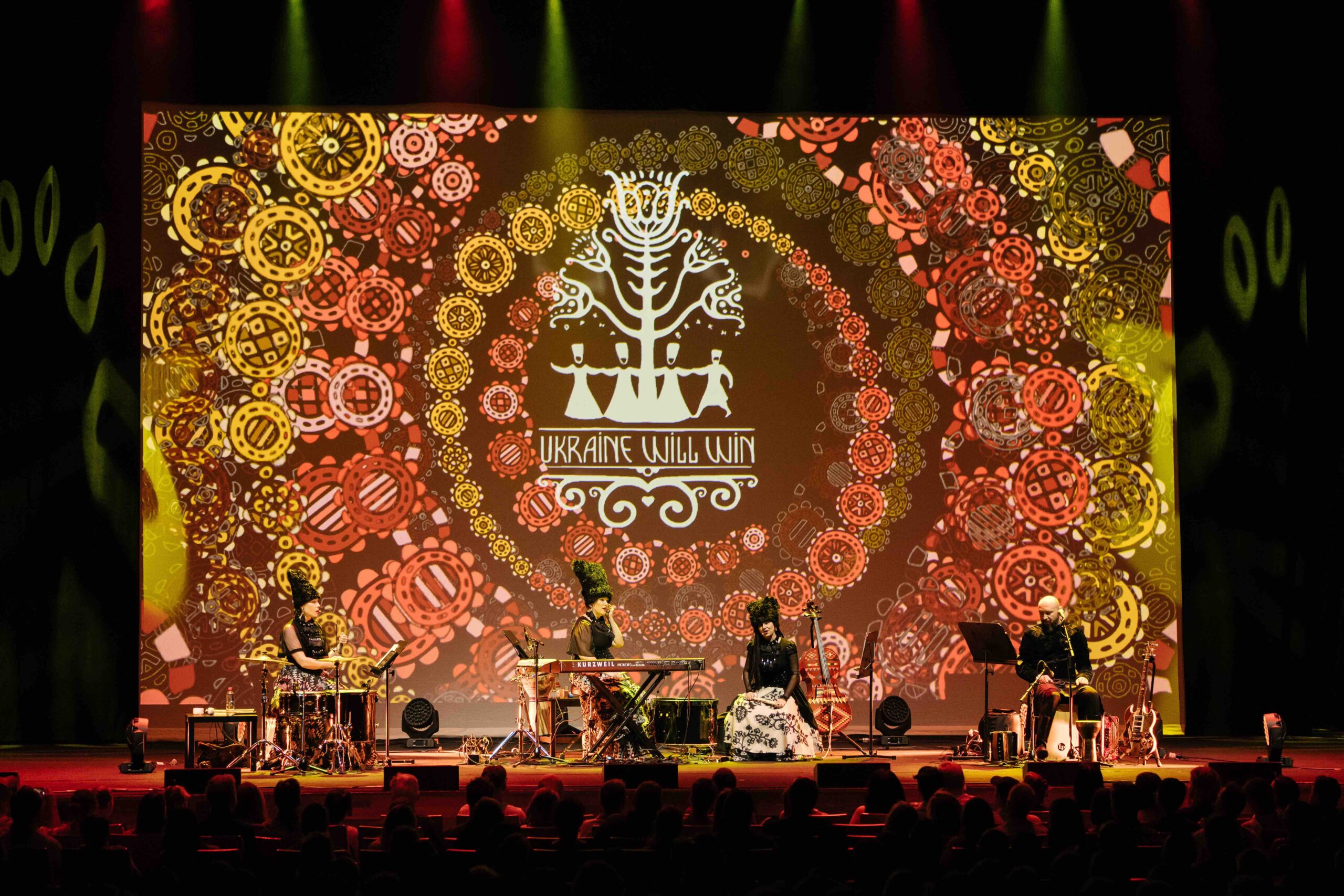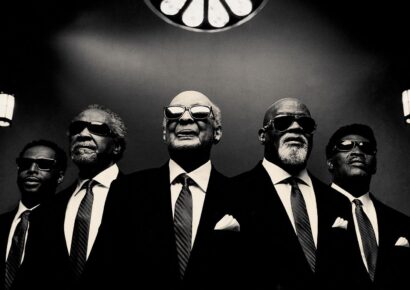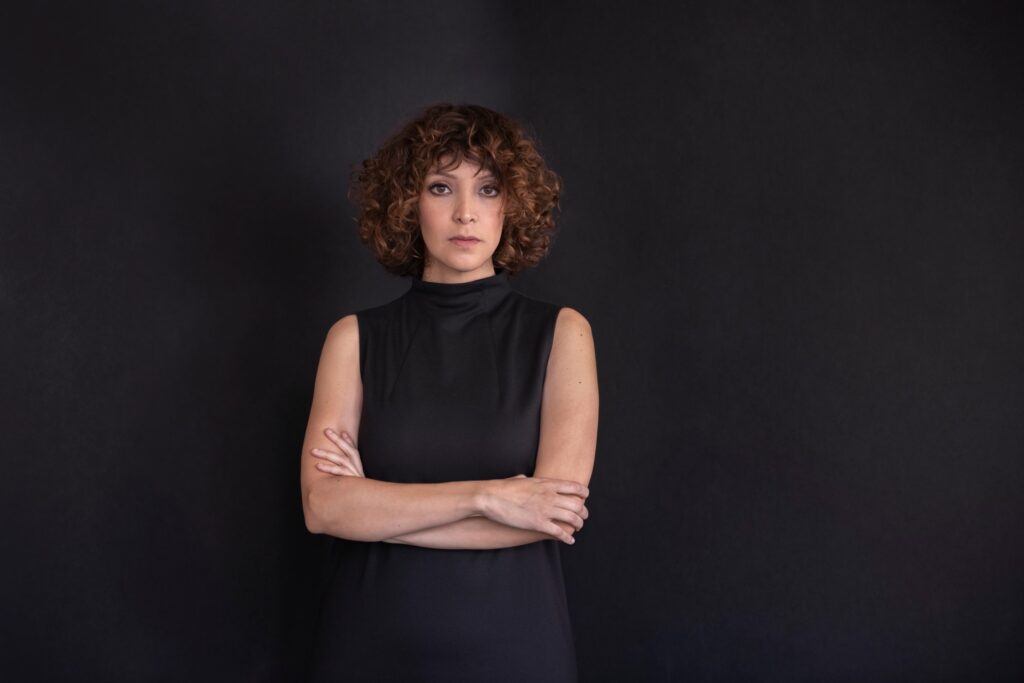Ukraine will win.
These words are projected in stark white against the black screen with a delicate illustration of the multi-instrumentalist quartet, DakhaBrakha, as they take the stage at Hamer Hall. This interstitial message appears again and again throughout the performance, a constant refrain for an evening, for two years of invasion.
They enter in the neotraditional folk dress that has become their signature, Iryna Kovalenko, Olena Tsybulska and Nina Garenetska in tall hats and wide patterned skirts with a slash of red lipstick, Marko Halanevych in a black collared coat and high boots. This is the 20th anniversary of DakhaBrakha’s birth in Kyiv, and they cannot go home. Troubadours, activists, educators, they make more than music. Their name is Give/Take in the old language, and they wander the earth, spread Ukrainianness, and keep the ears of the world open.
Ukraine will win.
Keep up with the latest music news, features, festivals, interviews and reviews here.
Folk is at the heart of their performance, suppressed in Ukraine during Soviet rule and embraced by the new nation that emerged. DakhaBrakha is new Ukraine, young nation-making, international, both pre-colonial and post-Soviet, working within a global network of art and music. Their famed ‘Ethno Chaos’ is the core of their message, to see Ukraine not as a monolith, but as a cosmopolitan culture that takes in other cultures, and gives in return. Give/Take. It is in every element, from instrumentation spanning electric keyboards, piano accordion, rock drumkit, djembe, cello and more, to the overlapping vocals that are a tapestry of traditional Eastern European ‘white voice’, Western singing styles, Halanevych’s jazz-inflected trumpet mimicry and spoken word, as in the poetic ‘I’ve Boarded the Wrong Plane.’
What does Ethno Chaos sound like? Their set jumps between tone and style, a mix of love songs, contemporary poetry, folk stories, tales of homecoming and leaving, seasons that mark out time and change, songs of celebration and sorrow. They work in textural, layered sound with distinctive percussive heartbeats, exemplified in the hypnotic crowd-favourite, ‘Vesna’, that builds with elements of both Ukrainian folk and even punk-celt revival melodies and drone. It shows that pastiche of influences that makes it difficult to pin down exactly what DakhaBrakha is. And this chaos is a strength, allowing them to draw in sinews of music that connect Ukraine with the world. In ‘Sonnet’, they jump from pigeon-like coo-ing into a Weimer-style cabaret sound a la The Tiger Lillies, then the audience struggles valiantly to lead the clapping rhythm behind the groovy croon of ‘Vynnaya Ya’ (“It’s not easy!” they tell us, and god they’re right). A twang of mouth harp leads us into ‘Karpatskyi Rep’, the deep gothic undercurrent of cello carrying a wailing ballad and hip-hop patter of a litany of unworthy suitors in the Carpathian mountains.
Ukraine will win.
Animations from different artists are projected behind them, bright and bold, some celebratory, some curious, others dark: collages merging bodies with bombed out buildings; a procession of Motanka – the faceless woven guardian dolls of Ukrainian tradition – in blood red; exuberant ‘primitive’ folk art; sketched caricatures of ill-fated men caught by a spider bride; regional embroidery, as you would find on a vyshyvanka, merged with a flamboyant Day of the Dead-esque skull and traditional peasant hairstyles; a child toddling from the cradle through the fields and ending with the sobering statistic of the 19,000 children kidnapped by Russia from occupied territories. Then a video of the Ukrainian armed forces, handheld and raw, muddy, young, smiling, with weapons or food or cats (‘war cats’ are an integral part of the frontline).
Ukraine will win.
DakhaBrakha’s songs span years of performance prior to the invasion, but war is in everything now. Then, in that disarming grim-grinning Ukrainian style of humour, we move from footage of frontline defenders, menaced children and skies filled with warplanes to a pre-encore auction of one of Halanevych’s paintings of DakhaBrakha (titled ‘Spring’), with money going directly to the Ukrainian armed forces. Beginning at $300, bids rise so quickly that it sorely tests Halanevych’s English language skills to count quickly through the thousands before it ends at $4200. We finish on the soft lounge lullaby of ‘Baby’, and the final screens as they take a bow for the standing ovation are QR codes to donate to their chosen causes: Come Back Alive, Ptahy, Help Razom.
Ukraine will win.
Churches burn, homes crumble, art is pillaged, children are taken and missiles turn human lives into pixelated splatters on news posts. The artists are elsewhere, showing diaspora not as the shattering of a culture, but the reaching outwards. Wanderers who cannot return but bring their homeland with them, finding threads to weave together and make a new, living Ukraine.
See the latest events happening at Arts Centre Melbourne here.







